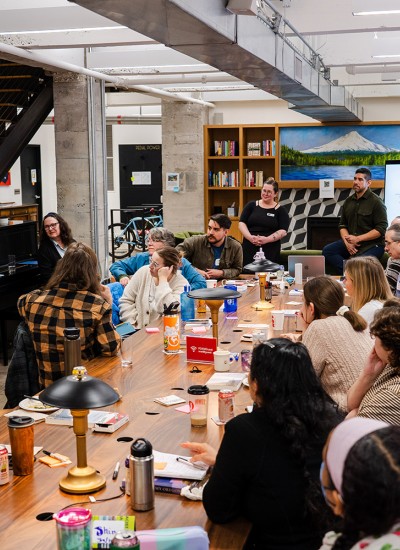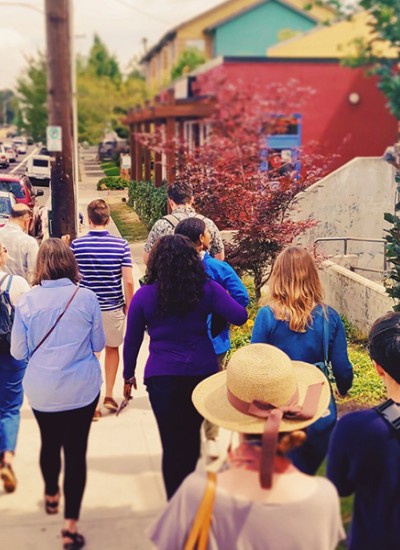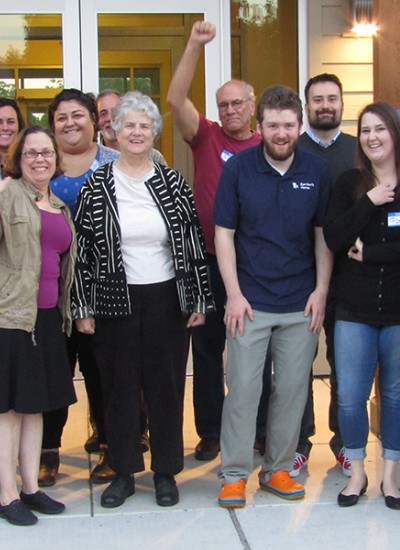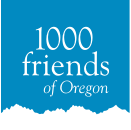Our flagship program, training the next generation of land use advocates
Applications for the 2026 LULI cohort have closed.
Please fill out the form below to be notified about future LULI events.
Having trouble filling out the interest form? Email our team.
Why become a LULI?
Right now, across Oregon, important decisions are being made about housing, transportation, and other land use issues that impact all of us. These decisions are often made without community input, creating a mismatch with the real and growing needs of our community for things like affordable and accessible housing, public and active transportation options, access to locally produced healthy foods, and a stable climate.
Since 2012, 1000 Friends of Oregon’s LULI training program has mentored more than 250 community leaders on Oregon’s land use system and how it shapes communities’ most pressing decisions about land development and use. LULI works to prepare participants to be effective voices in local and state decisions about issues that matter to them
LULI is about much more than land use. It brings together community leaders with a wide range of perspectives to work together for the outcomes our communities need. Together we’re building diverse, grassroots capacity to engage on land use debates and issues.

Who should apply to LULI
Please apply to a future cohort if any of these describe you:
- You believe in the value of contributing to the community and to good governance.
- You want to expand your advocacy tools and have a greater impact on land use issues.
- You love Oregon and want to protect our farms and forests, conserve natural areas, and enhance quality of life in urban and rural communities.
- You are committed to collaboration, transparency, and accountability.
- You are an advocate for anti-racism, equity, diversity, inclusion, and environmental justice.
LULI will bring together a cohort of dynamic, problem-solving Oregonians to learn about a variety of policy options and take action to help improve the region.
“I was given an amazing opportunity that reminded me why I advocate for affordable housing. This program gave me resources to use and go to when working on land use issues with others.” – Princess F. | LULI Southern Oregon Graduate 2018
What is the time commitment?
Duration of program: Our 2025 cohort kicked off in February and graduated in mid-June.
Monthly time commitment: LULI requires a commitment of seven to eight hours per month, spread out among one to two meetings per month.
Meetings are a mix of in-person and virtual sessions conducted via Zoom with automated captioning. Participation requires an internet connection as well as a computer, tablet, or smartphone capable of supporting audio and video running the Zoom application. If the technology requirements for being a LULI present a barrier for you, please do not let that stop you from applying.
Does LULI cost anything?
No. Thanks to the generous support of a grant from East Multnomah Soil and Water Conservation District and individual donors, we are able to offer the 2026 program free of charge to LULIs. We also are able to offer:
Transportation and food: We offer transit passes and parking passes to remove major transportation barriers to participating in LULI. Food and nonalcoholic beverages are be provided at all in-person sessions.
Interpretation and translation: We are readily able to provide interpretation and translation to support participation in LULI.
Materials in an alternative format, auxiliary aids, or other accommodations: If you let us know, we will do our best to provide materials in an alternative format, auxiliary aids, or other accommodations to support your participation in LULI.

About LULI
We know that the integrity of the land use system is best supported by active civic involvement of residents in their own communities. That’s why we’ve always worked with local residents to ensure that land use decisions are informed and sound. To enhance that work, we started the Land Use Leadership Initiative (LULI) in 2012 to educate and activate local leaders and passionate community members on land use issues.
Initially, LULI was a statewide program, but over the years we’ve recognized that the program was best tailored to regional areas with a focus on issues that are relevant to participants.
All elected officials in Oregon should be required to take a course like this. I learned more in a few weeks than I did in four years as a Medford City Council member.
-John Statler, LULI graduate
Land Use Leadership Initiative participants (also known as LULIs) connect through interactive training, site visits, and workshops. The program showcases Oregon’s innovative land use planning system, highlights the most-pressing land development issues and creates a forum for LULIs to further hone leadership skills to help create and advance solutions to issues that matter to them.
In 2018 we expanded the LULI program and held our first out-of-Metro cohort in Southern Oregon to empower current and emerging land use leaders across Oregon. After a third LULI program in Southern Oregon in 2022 we held the first Central Oregon LULI starting in the fall 2022.
We have now run ten cohorts, graduating more than 250 LULIs! Our plan is to expand into more areas of the state and to continue to offer two cohorts a year.

What does a LULI program look like?
Only about 24 people are selected to participate in each cohort, and applying is often very competitive. We encourage any interested person to apply, and we work hard to create diverse cohorts consisting of people from all racial, gender, socio-economic, and political backgrounds.
Over the course of nine sessions, LULIs participate in interactive workshops, site visits, and trainings that cover the fundamentals of land use policy. LULIs also have the opportunity to develop and hone leadership skills such as advocacy, public speaking, research, and public engagement. The LULI program features:
- An orientation where LULI participants connect and network, learn about the creation of Oregon’s land use planning system and establish goals for the program.
- Interactive training sessions with community leaders, agency staff, elected officials, and data specialists.
- Skill-building opportunities, where LULIs work with each other and with seasoned activists and decision-makers to become more effective champions of their own issues.
- Reviews, where LULIs can interact with session speakers and LULI graduates to reflect on lessons from throughout the LULI program.
- Support for ongoing connection with past and future LULI fellows and 1000 Friends of Oregon policy staff.
- Assistance with transportation, childcare, and other program expenses.
Access to an online portal with session materials, speaker contact information, and interactive forum to connect with the LULI network.
About us
1000 Friends of Oregon was founded in 1974 as a 501(c)(3) non-profit public interest watchdog for government agencies tasked with managing land use issues. For almost half a century, we’ve operated independently of partisan politics, holding local governments and state agencies accountable to ensure that the innovative system Oregon adopted with Senate Bill 100 (most commonly known through urban growth boundaries and farmland protection) is carried out true to the spirit of sustainable land use.
Another LULI cohort graduates
Our state now has more than two dozen new land use leaders who will take the tenets of a strong, protective land use program and apply them in their diverse fields of work. These Oregonians join a network of LULIs across the state who better understand how the land use planning program impacts issues they care about.
- 2012 Statewide | Oregon's statewide planning goals & guidelines
- 2013 Statewide | Oregon's statewide planning goals & guidelines
- 2014 Portland Metro | Climate-smart communities
- 2016 Portland Metro | Southwest Corridor Project
- 2018 Southern Oregon | Oregon's statewide planning goals & guidelines, and local housing issues & solutions
- 2019 Portland Metro | Climate-smart communities revisited
- 2020 Southern Oregon | Housing issues and solutions, and wildfire
- 2021 Portland Metro & Southern Willamette Valley | Missing middle housing and effective advocacy
- 2022 Southern Oregon | Housing issues and solutions, and wildfire
- 2022–2023 Central Oregon | Water as a land use issue
- 2025 Portland Metro | Reimagining the American Dream
- Orientation
- Where did the land use program come from, and how is it structured?
- The whys and hows of urban growth boundaries
- Housing for all
- Transportation that works for everyone
- Building (and re-building) fire- and climate-resilient communities
- Agriculture and food systems
- Healthy forests, energy facilities, and other rural land use issues
- Ins and outs of advocacy
